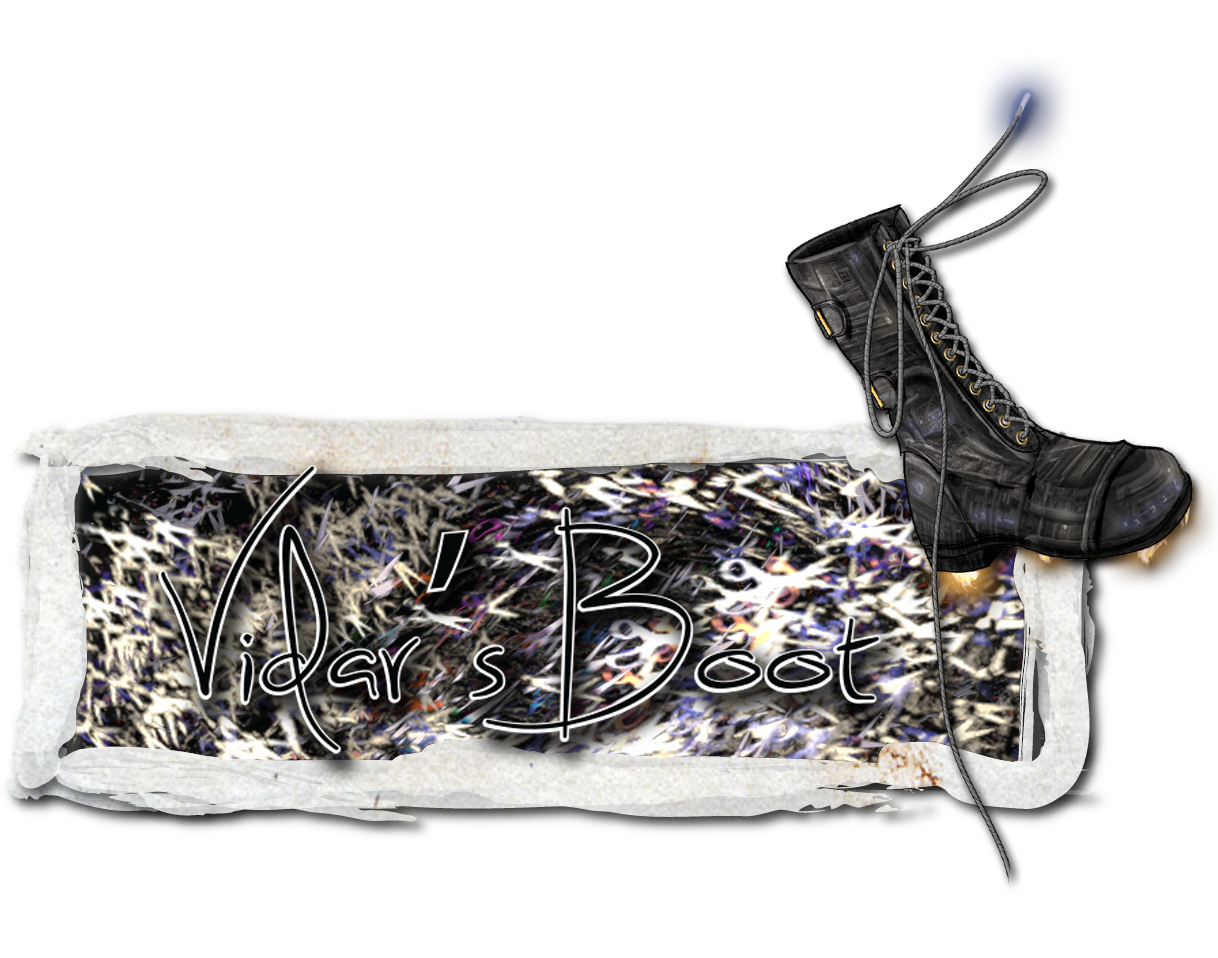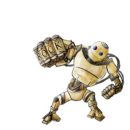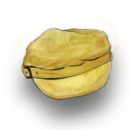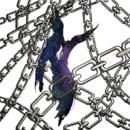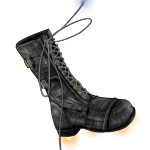– 1 –
Jeremiah Clean’s got the world just about straightened out, now.
There was a bit of a kink. A bit of a hitch, if you know what I mean, roundabouts the time Hans was ending. But the new guy’s grown into his job now. He’s got it covered.
He’s even getting known.
His life is pretty sweet, now. People respect him. They tip their hat to him when he passes them in the halls. He’ll tip his hat right back.
“Mr. Brown,” he’ll say. Or “Mr. Evans.” —
Well, wait. Not “Mr. Evans.”
“Mr. Brown,” he’ll say. Or “Mr. Pungent.” Or whatever else is the person’s name. Maybe even “Ms. Edrafille Imbroglio.”
But not “Mr. Evans.”
He took care of the Evans’.
And they’ll say, of course: “Mr. Clean.”
The world’s practically polished, spit and polished, now, and yet —
Somehow it doesn’t make him happy.
He’d thought, if he could just get all these horrors under control. These giant wolves and giant snakes, the big scorpions, the crime —
That he’d be happy.
He looks at the world, though, and it’s still not clean.
– 2 –
The years slip past.
Protestors pin a complaint to Martin’s door. It alleges that he is harboring a moon-eating wolf.
Joffun finds a heart in a stone box by the ruins of Gulley Mansion. He is delighted. He laughs, he dances. Then he goes silent.
He looks a little bit sad as he drifts down back below the surfaces of things.
Sally travels to the North Pole to conduct a survey, and, also, to die.
– 3 –
Remember back when you played rock-paper-scissors?
Remember when you played scissors against Navvy Jim?
I’m not saying that was bad. There’s nothing wrong with scissors. I’m not even saying you did that.
But if you played scissors, well, here you are.
– 4 –
The survey is about polar bears. Traditionally, polar bears receive their surveys by post, but this time, Sally’s boss sent her north.
“Polar bear literacy rates are reported at 98%,” said Sally’s boss. This is the kind of thing the Formerly Lethal Corporation does in the après-apocalypse environment. “I don’t believe those numbers. I think that many polar bears are ashamed to admit that they can’t read. Others, unable to read, eat our survey. It’s a tasty paper treat! We can fix the first problem with marketing — making it glamorous to admit one’s flaws. But to fix the second problem we need someone on the site. We need someone to go there and put the question to the polar bears directly!”
“Me,” said Sally. Her voice was quiet and her affect blank. “Send me.”
“That’s wonderful!” exclaimed her boss, and hugged her. That’s one reason why Sally is traveling north.
The other is that she’s had a hard life and she’s tired.
Sally reaches the north pole and begins lining up polar bears. She administers the survey to each. It becomes rapidly obvious that very few polar bears can read. Some even try to eat her. Sally does not want to live. But she clings to life. When they snarl and bite at her, she flees across the snow. Behind her, a more civilized bear runs interference, crying, “Without table manners, we are nothing more than animals! White furry animals! With teeth! Please, you must show restraint!”
Sally does not hear. She runs, and runs, until the ice cracks beneath her feet and she falls into a cavern beneath the snow.
“I don’t deserve to live,” she says. “I have no value.”
A time passes, in the dark.
“But it’s so very cold.”
So she lights a flashlight and looks around her. She’s in a great cavern, and all around her, in frozen sleep, they are.
“What are you?” she says. But she knows. This is a thing that was not meant to exist in her world.
She stands. She hobbles over. She stares at them.
There are princes in shining mail, and great beasts, and witches, and old women, and golden spindles. There is Princess Anthology, who would have been for Peter, and the crow that could have saved Linus from his fate. And there, to the left, is hers. Her prince.
She touches his frozen skin. “I had a wicked stepmother,” she tells him. “I ran away from her, and I lived in the forest, and you did not come.”
It wasn’t a forest. It was a boarding school. She is taking poetic license.
“She enchanted me, and I lived with that enchantment —”
That enchantment: you are no one important.
“And in the end I heard that she had died and turned to ash and been scattered, but even so, the enchantment didn’t break.”
The prince is silent.
Sally touches his face. It is frozen.
“And you didn’t come,” she says.
Sally walks through that great cavern, and sees them all, and after a time, she tells them the story of that place.
“You were here before us,” she says. “I don’t even know if there were people. You were here before us, you shining principles. You were heroes. You were Kings and you were Queens. And you fought for us, you were our salvation — for there were monsters back then, nightmares and horrors, that were just as much made for us as you. And you won. You won, you were winning. But the world grew cold.
“‘We shall die,’ said the princes, and the princesses with their golden hair, and the beasts that spoke, and the witches, and the frogs. ‘We shall die. The world grows cold.’
“And so you came to the coldest place of all and buried yourselves here. Not to die. Not truly. Simply to be. And the lady of winter kept you. That must have been what happened.”
Sally sits, leaning against an ice-pink unicorn. Its face is feral and wild.
“I do not think I can revive you,” she says. “I do not think anybody can.”
The unicorn is silent. Sally’s prince does not move.
If she escapes, she knows —
If she survives this, then she will say it. She will tell people. She will tell people, even though she’ll tell herself not to, and they will come, and they will see.
“I must die here,” she says. “So I won’t tell them. They must never know.
“The universe cares for us more than I can bear, and that gift is frozen, under the ice.”
– 5 –
One day Jeremiah Clean is working, and he remembers the moment of Hans’ death; he remembers what that felt like, what it felt like to become sacred, clean, and pure.
He dresses the same way as any other day. Maybe it’s a little sharper, now.
He puts on a hat.
It’s not a magic hat. It’s just . . . maybe it’s a memory, that there were magic hats, once upon a time.
Then he begins.
“Let’s finish this,” he says.
After Gotterdammerung, there is a new world: a bright world, a pure world, a safe world; but as bright as it may be, as pure as it may be, as clean as it may be, it is endlessly too dirty still for a man like Jeremiah Clean.
– 6 –
He lines up the rational numbers. He looks at the grimy irrational numbers between them. He grins smugly, takes out his Swiffer, and begins to Swiff them all away.
This kind of thing upsets most mathematicians. It has Cantor practically spinning in his grave.
. . . but that’s not what this story is about.
– 7 –
A terrible ray, a terrible horrible ray, a monstrous needle-thin ray certain to destroy the Earth, is still pouring at the speed of light through the boundless reaches of space. It has traveled for nearly seven hundred years and soon it will strike. It will end life as we understand it. There will be no world. There will be no humanity. There will be nothing that we know. There will only be the Decohesion Engine, Principle of Omnipotence, a power born in death and a terrible light.
It is bad!
Oh, wicked god of space, it is terrible!
. . . but that’s not what this story is about, either.
– 8 –
And somewhere Bethany is straggling through life without a nithrid. And somewhere Peter is huddled in the brig of a Fan Hoeng scissors-ship, and he is weeping, because all he ever got to do with his life was save a few hundred assassin-aliens whom he doesn’t even like and the last scissors in the world.
And you kind of feel bad for him, I guess, sort of, but he isn’t who this story is about.
None of them are.
– 10 –
Mr. Enemy is flopped back on his jail bunk. His hands are folded behind his head. He’s laughing.
“Mr. Evans,” says Special Agent Melanie Cook.
His laugh cuts short. Mr. Enemy sits up. His motion is smooth and even and he doesn’t hit his head on the bunk above him.
“I’m not Mr. Evans,” says Mr. Enemy. “Though I used to be.”
“What do you mean?”
“It’s not important what your enemy’s name is,” says Mr. Enemy. “It’s not important what he does for a living. It’s not important who he is, really. What’s important is that he’s your enemy. Jeremiah Clean scrubbed me clean. He scrubbed everything unimportant away. All the Linus. All the Friedman. All the Evans. So now I’m just Mr. Enemy. His enemy. If you know what I mean.”
Melanie looks at her notes. “You’re in jail for 1,427 counts of aggravated littering,” she says.
“90% of all crimes go unsolved,” says Mr. Enemy. “It should be 14,270 counts. But an adversarial legal system refuses me my due.”
Melanie frowns at her notes. “How do you aggravate littering, anyway?”
“It’s my special talent,” says Mr. Enemy. “Observe.”
He takes a cigarette butt out from under his pillow. He flicks it onto the ground in front of Melanie. The burnt end flares and begins to emit seventh-hand smoke—sixty-four times deadlier than second-hand smoke! Melanie quickly stomps it out.
“I’m not afraid of getting lung cancer,” she says, boldly.
He looks at her.
She looks away.
“I’m afraid of you getting lung cancer,” says Mr. Enemy, after a moment. “I’m not your enemy. But I have to be as messy as possible or I can’t count it as a blow against Jeremiah Clean.”
Mr. Enemy pulls half a sandwich out from under his pillow. It’s covered in greasy saran wrap. It’s a peanut butter sandwich, so it’s not clear where the grease came from. He bites deep.
“What do you need me for?”
“What does it mean to you,” Melanie asks, “that you’re Jeremiah Clean’s enemy?”
Mr. Enemy gestures with the sandwich. Now there’s peanut butter on the cell wall. It’s a horribly artistic Rorschach smear.
“There’s an obstacle in everyone’s path,” Mr. Enemy says. “There’s a stumbling block. Someone or something who gets in the way. Someone who is the antithesis of what you believe in. Someone who means, just ’cause they exist, that you can’t have what you want. That’s what it means to be an enemy. That’s what it means to be bad, you know, in someone else’s world.”
“Not everything has an enemy,” Melanie says.
“If we didn’t have enemies,” says Mr. Enemy, “we’d be as gods. Look.”
He holds up the saran-wrapped sandwich.
“Thon-Gul X is the warlord of a distant star. He is the incarnate body of the wicked god of space, and he wants to destroy the world. He would do it, too. He’d destroy everything, if he had to, just to get at us. He would make himself into the warlord, the beginning and the ending, wrapped around space and time. But —
“There is saran wrap.
“It clings between Thon-Gul X and his plans. If he could destroy it, then he would be unlimited. But he cannot, because — well, ultimately, because saran wrap is another aspect of himself.”
“It was invented on Earth.”
“‘If only it did not thus cling!’” Mr. Enemy quotes in satisfaction. “But it is clinging. Thus is the lament of Thon-Gul X.”
“I find your evidence uncompelling.”
“Name me something else, then,” says Mr. Enemy. “I’ll tell you its enemy.”
“Pickles.”
“Cucumbers.”
“Pardon?”
“Pickles cannot triumph while cucumbers exist. Yet without cucumbers, there would be no pickles.”
Mr. Enemy finishes his sandwich. He tucks the saran wrap in his pocket.
“Reason.”
“The insufficiency of reason.”
“My childhood imaginary friend Betty.”
Mr. Enemy laughs.
“What?”
“You’re expecting me to say ‘adulthood,’” he says. “But it’s not true. It could only have been the turtle-people.”
Melanie fights to keep sudden tears from her eyes. She can still remember Betty’s pleading eyes as the turtle-people tied her to the stake.
Mr. Enemy is staring at her. Then he looks down. “I’m sorry,” he says. “I hadn’t really —”
He trails off.
Melanie shakes her head to clear it.
“So why are you his enemy?” Melanie asks.
“Because I understand what he does not,” says Mr. Enemy. “I realize that there is no finality in cleanliness save the empty void. I understand that clean and simple order is the enemy of the small things, that it has no room for small things, and that, in the end, we are all of us small. That is why I must oppose him.”
“By keeping half-eaten sandwiches under your pillow?”
Mr. Enemy shrugs. “The philosophy of disorder has its own philosophical flaws which we need not explore at this time. Since, you know.”
“It’s gross.”
“Agent Cook,” says Mr. Enemy, “Life is gross.”
Melanie sighs. Then she opens his cell. She walks with him through several layers of security, out of the prison, to her car.
“It’s nice to see the sky again,” says Mr. Enemy.
He looks around.
Sometimes he thinks he might be indwelt by the Devil. Other times he thinks a transparent dog is there, panting, looking at him. He can’t see it, so he doesn’t know whether he blinks and it isn’t there.
There’s a lot of things that could be wrong with him, really, but it’s a gorgeous day, and that makes it better.
The sky is blue. There are no clouds.
There is no sun.
There is no moon.
There are no stars.
He can see his reflection in it — that’s how shiny and clean the blue sky is!
It looks so goddamn beautiful that he’d almost want to cry.
“We tried to arrest him,” says Melanie, “but he just removed the unsightly federal agents with hot water and scrubbing bubbles.”
“I hope you’re not thinking that I can do better,” says Mr. Enemy. “I’ve never actually won against him, you know. Not even once.”
“But you’re his enemy,” she says.
“We’ll confront him,” says Mr. Enemy. “And he’ll scrub us away, and that’ll be the end of it. I expect he’s already used Hell-B-Gone on whatever would have happened next.”
“I guess it’s just hopeless, then,” she says.
She gets in the car. They begin to drive.
Mr. Enemy looks around perkily for things to litter with. He finds a bagged and tagged corpse in the back seat, leftover from a deprioritized murder case, and heaves it out the window. It thumps and rolls down the road.
“If everybody did that,” Melanie says critically, “the roads would be trashheaps.”
“Enh,” says Mr. Enemy.
“So why are you willing to fight him,” Melanie says, “if he’s just going to mop us up?”
“Why are you?”
She shrugs.
“I’m really more of the principle that he has an enemy than an actual enemy,” Mr. Enemy admits. He finds a Styrofoam cup and tosses it out the window. It hits the ground behind them and explodes into a steaming pile of goop. “So that’s why. He left me alive, but I’ve been pretty awfully messy. I think this time, he’ll wipe me completely away.”
“You want to die?”
“I figure, if he removes that principle,” says Mr. Enemy, “then he’ll have no way to externalize conflict. Since the division between cleanliness and untidiness is itself an untidy thing, I think that might doom him — that he might become Mr. Enemy. That’s pretty much all I got, as a plan.”
“If he becomes Mr. Enemy, won’t that mean that you become him?”
Mr. Enemy spits his gum out the window. It gums together a spotted owl and a bald eagle, causing both to lose their aerodynamic qualities and plummet screaming to the ground.
“. . . don’t make me turn the car around,” says Melanie.
“Yeah,” Mr. Enemy says. “It means I become him.”
“You’re willing to become everything you loathe and oppose just to make him unhappy?”
Mr. Enemy looks away for a long moment.
“Yeah,” he says. “Yeah, I think I honestly am. I’m very good at being Mr. Enemy, Agent Cook.”
She sighs. “I hate working with martyrs.”
“I’m not a martyr,” Mr. Enemy says. He tosses his saran wrap out the window. It flutters in the wind and sticks to a tree. “I’m an aggravated litterer.”
“He mopped away the messy distinction between quantum mechanics and general relativity, you know.”
“I’m not surprised,” says Mr. Enemy.
And they’re driving on.
– 11 –
His saran wrap —
It clings to a tree in the cleanly world behind them.
It is only scarcely conscious. It has only the vaguest notion that a ray sent seven hundred years’ distance by the Warlord Thon-Gul X is hitting it square-on from the depths of space. It does not know what it means that this terrible needle of decohesion energy threatens to overwhelm it.
It only knows, as it has always known, that it must cling.
It must hold to itself, and keep on holding.
And the warlord Thon-Gul X is lamenting. He weeps and wails in his distant palace, drowned in its endless starless blue.
“If only it did not thus cling!” cries the wicked warlord; if only!
But enemies endure.
